- Home
- Michael Thomas Ford
Jane Goes Batty jb-2 Page 3
Jane Goes Batty jb-2 Read online
Page 3
Jane sighed. “I would glamor him—or her—as much as possible and then summon you to deal with the problem.”
“You can’t,” said Byron. “I’ve been staked. You’re on your own.”
“Oh, bother. Well, I suppose I could drain him—or her—myself, but you know I draw the line at murder.”
“You did kill Our Gloomy Friend,” Byron reminded her.
“She was already dead,” said Jane.
“You didn’t know that at the time,” Byron countered. “You thought she was a psychotic blogger who was trying to blackmail you.”
Jane huffed. “Anyway, I didn’t push her into that fire. She fell. And she came back and tried to kill us, in case you’ve forgotten.” She paused, remembering Lucy’s earlier question. “Speaking of Our Gloomy Friend, I wonder where she is. Do you think she’ll try again? It’s been nine months.”
“That’s barely a second in vampire time,” Byron answered. “I wouldn’t be surprised if she was planning something. But that’s even more reason for you to perfect your vanishing. When you are faced with someone wishing to do you harm, the best course of action is to simply disappear.” He looked thoughtful. “Of course, you could always transform yourself into a bat, but—”
“A bat?” Jane exclaimed. “I thought that was a myth.”
Byron shook his head. “No, it’s quite true. But it’s a very advanced technique. You’re not nearly ready for it.”
“What else can I turn into?” asked Jane.
“That’s it,” said Byron. “Just a bat. And no, I don’t know why. That’s just how it is.”
“But if one can turn into a bat, then doesn’t that suggest that the power of transformation might be more widely—”
“A bat,” Byron repeated sternly. “Not a cat, not a wolf, not a giant sloth. A bat. And you can’t even do that. Not until you master disappearing.”
“I wasn’t aware there was a larger goal,” said Jane. “Perhaps I just needed some incentive. I mean, a bat … well, that’s something.” A thought occurred to her. “What kind of bat?” she asked.
Byron sighed. “I don’t know,” he said. “A vampire bat, I suppose.”
“But there are lots of kinds of bats,” Jane countered. “Fruit bats. Spotted bats. Little brown bats. And of course the flying foxes, which aren’t foxes at all but—”
“Tell you what,” Byron interrupted. “One night I’ll turn into a bat and you can look me up in a field guide.”
“Don’t think I won’t,” said Jane. “Now let me try disappearing again.”
“No,” Byron said. “I don’t want trying; I want doing. Go home and practice, and don’t call me until you’re absolutely sure you can vanish and stay vanished for at least five minutes.”
“That could take centuries,” said Jane moodily.
Byron smiled. “Then it’s a good thing we’re vampires.” He opened the door. “Now I’m going to see if Ned would like to get some lunch.”
“Ted,” Jane said without thinking. “You mean Ted.”
“Whichever,” said Byron. “They’re both delicious.”
When Byron was gone Jane picked up Judaism for Dummies and opened it. She sighed. I hope being Jewish is easier than being a vampire, she thought. There has to be something I’m good at.
Chapter 3
Ha, noch einen ganzen Tag,
Uberlang ist diese Zeit.
Zwei Opfer sind mit schon geweiht
Und das dritte ist leicht gefunden.
Ha, welche Lust aus schonen Augen
An bluhender Brust neues Leben In
wonnigem Beben
Mit einem Kusse in sich zu saugen.
“Flowering bosom, indeed,” Jane sighed as she took a sip of wine from the glass next to her keyboard. The glass was almost empty. Should I have some more? she asked herself, knowing full well that she should not. She’d already refilled the glass twice. Although her altered constitution allowed her to tolerate more than a normal human body could, she was nonetheless feeling the effects of the merlot.
“I believe I’m tipsy, Jasper,” she announced. The dog, splayed on the rug beside her chair, thumped his stub of a tail.
“I must be if I thought listening to Marschner was a wise idea.” She picked up the CD case and looked at it. The cover depicted a naked woman seated on a bed, her back to the viewer. In front of her stood a dark-haired man wearing a tuxedo. Only if one looked very closely would one see the drops of blood on the man’s shirt and the two tiny punctures on the woman’s neck. “Der Vampyr,” Jane said in a deep voice, then giggled. “Honestly.”
Marschner’s opera was not really to her liking. For one thing, she found the German language completely without appeal. As a friend had once said, “It always sounds as if they’re on the verge of coughing something up.” For another, the libretto was ridiculous. “Not that most of them aren’t,” Jane remarked to Jasper. “But this one is particularly melodramatic. You see, Lord Ruthven is a vampire. One night—I don’t know why—the Vampire Master comes to him and informs him that unless he is able to kill three virgins before the clock strikes one the next morning, he’ll die. If he can kill three of them, he gets to live another year.”
Jane took another drink of wine. “Of course there is no such thing as a Vampire Master,” she continued. “And the rest is equally silly. Something about a cave and moonlight and Ruthven pretending to be his own brother. It all ends badly for him and he goes to hell.”
Jasper yawned.
“My sentiments exactly,” Jane agreed. “Still, I can’t help feeling a bit sentimental toward it.”
In the spring of 1828 she had been dead for nearly eleven years and the novelty had not yet worn off. For reasons she could not now recall she was in Leipzig. Hearing that a new opera about a vampire had recently premiered, she was curious to see it. When she found out that the opera was based on Dr. John Polidori’s novel The Vampyre, she was even more intrigued. It was Polidori, after all, who had vacationed with Byron at the villa on Lake Geneva the summer Jane was turned.
“I suppose I thought I might understand him better or some such foolish notion,” Jane informed Jasper. “Byron, that is. I hadn’t quite given up hope that he might yet love me.”
The opera had devastated her. Sitting in the darkness of the balcony she had watched with mounting terror as the young woman, Janthe, fell under the spell of the handsome vampire and became his first victim. Several times she had to stop herself from crying out to the girl to run. But just as Jane had been entranced by Byron’s beauty, Janthe fell prey to Ruthven’s charms. During the soprano’s final lines Jane had wept uncontrollably, and at the intermission she had fled into the night.
She had returned to the opera a week later, determined to see it through to the end. This time as she watched Lord Ruthven seduce and destroy first Janthe and then Emily, her sorrow was replaced with anger. At the finale, when Ruthven’s evil plan to marry the chaste and virtuous Malwina and thus secure his immortality was thwarted by Malwina’s true love, Edgar, Jane applauded fiercely, not only for the fine performances but for the triumph of good over evil.
For years she had hated Byron and often thought about what she would say or do should she see him again. Then, when he’d first appeared in her bookshop, she had immediately felt the draw of him as if no time at all had passed. He was still dashing, and his wit had grown even sharper over the centuries. She had even succumbed to his charms once again and spent a night with him.
They had since come to terms with each other, and although Jane knew they could never again be lovers, there were still moments when she thought she was meant to be with him. She wouldn’t have to explain anything to him, or worry about him growing old.
“And I wouldn’t have to become Jewish,” she told Jasper.
But she wasn’t in love with Byron. Now she was in love with Walter, and she and Byron were merely friends. Besides, Byron was always falling in love with other men, which made it considerably more difficul
t to imagine spending an eternity with him.
Jane pushed thoughts of Byron and vampires and Leipzig from her mind and turned back to the computer screen. She had decided to play Der Vampyr out of some hope that it might inspire her. She had a vague idea that she wanted to write about longing and loss, and she thought perhaps listening to Marschner’s opera would put her in the mood.
It had not. At the top of the page of the open word-processing document was “Chapter 3.” Beneath that was precisely one sentence. And it’s not even a good one, Jane thought miserably.
Her new book had been due on her editor’s desk at the first of the year. Six months later—despite assuring Kelly that she was almost finished—she had barely begun it. Every day she sat down at the computer determined to write a chapter, and every day the hours passed with excruciating slowness as she did everything but write. After several months of this she had reduced her daily goal from a chapter to a page, and a few months after that from a page to a paragraph. Now she would be content with a sentence or two.
She should, she knew, be ecstatically enthusiastic about writing this novel. Constance was a huge success. Her bank account was full. The letters and emails from fans were gratifying. There was the movie to look forward to. And the reviews had been wonderful.
Well, most of them had been wonderful. There was one that continued to gnaw at Jane’s confidence. And like most stinging reviews, this one irked her because it mirrored her own fears about her novel’s flaws.
Instinctively she directed the mouse’s cursor to her Favorites folder and clicked on the link to Failures of Mimicry. The blog’s front page filled her browser window. Its tagline, “In which we prosecute crimes of literary identity theft,” leered at her in mocking accusation. She blushed.
She glanced at the latest entry. “Faux Faulkner: Peter Nesbitt’s Yucknapatawpha County,” she read. Much to her annoyance she found herself laughing at the play on Faulkner’s celebrated fictional setting. She did not, however, read the accompanying text. Instead, she went to the blog’s listing of earlier entries. For a moment she considered looking at “The Last Brontësaurus: Is Mary McTennant’s Ice Age upon Her?” Then she selected “Austenish: Jane Fairfax’s Constance Has an Identity Crisis.”
She had read the review so many times that she had memorized it. Still, there was something about seeing it in its original form that made revisiting it even more painful. As she read the words Jane mouthed them silently. She flew through the opening paragraphs quickly, slowing when she reached the heart of the post.
Jane Fairfax’s Constance is not the worst of the recent novels to unabashedly borrow from Austen, but it is arguably the most disappointing, for it contains a hint of its inspiration’s charm and wit but smothers it in a heavy sauce that leaves a bitter taste in the reader’s mouth. Where Austen is light and gay, Fairfax is dark and broody. Her characters are interesting, to be sure, but they seem intent on unhappiness. Constance is predisposed to sulkiness, and even when she finds love with Charles she seems restless and unfulfilled. One can almost imagine her happier with the brutish Jonathan, who at least exhibits some amount of passion, however twisted it might be. Ultimately one is left with the impression this is the novel Austen might have written following a blow to the heart. Or possibly the head.
Jane shut the window and leaned back in her chair. Not for the first time since stumbling across the site (damn Google and its ability to ferret out every last mention of her and her book) she considered writing the author a note. But she knew that would end poorly. Kelly had told her—and she’d soon found that he was quite right—not to read everything written about her. Unlike the past, when critics were allowed to criticize because they knew something about books and writing, the invention of the Internet made it possible for anyone with an opinion to share it. This was not, as far as Jane was concerned, a good thing.
She had to admit, however, that despite her relentlessly snarky tone the blog’s author was not stupid. Her name was Wen Bao, and if her biography was to be believed, she was thirty-three and lived in Fargo, North Dakota. What she did there was unclear, but Jane liked to imagine that she worked some dreary minimum-wage job simply in order to afford the books about which she wrote. As an ear piercer in a mall, perhaps, or a gift shop clerk at the Roger Maris Museum.
This was unkind of her, Jane knew, but it allowed her to not dislike Wen Bao as much as she might otherwise. She had disliked her upon first encountering the blog. That was only natural given her maternal feelings toward Constance. But after a few days (or perhaps it was weeks, or months) she had been able to read the post with a little more objectivity, and when she did so she was able to see that what Wen Bao had so succinctly stated were the very fears she herself had about her novel.
No, not fears. Truths. For she knew—had always known—that this novel was different from her others. But that was because she herself was changed. She had written Constance in a fever brought on by her infatuation with Byron. Their correspondence had awakened things in her, and these feelings found their way into her pen. Constance was, after all, her love letter to him. It was only natural that some of his infamous melancholy should color it.
And then there was what happened at Lake Geneva.
“They can hardly expect me to remain myself,” Jane told Jasper. “Not after that. And yet they don’t want me to change. They like me the way I am. Was. Not that they even know that I’m me. Still, it hardly seems fair to expect a woman to stand absolutely still for two hundred years. I’m not Jane Austen any longer, at least not their Jane Austen.”
She’d seen this before. She remembered when Amy Heckerling had borrowed liberally from Emma in creating her movie Clueless. A certain segment of Jane’s readership had cried foul, going so far as to say that Jane would be scandalized by what had been done to her novel.
“But I rather liked it,” said Jane as Jasper got up and padded out of the room. “How are they to know what I would and would not like, anyway? It’s not as if they know me. Really, knowing a writer through that writer’s books is about as likely as understanding the inner workings of a clock by listening to its chime.”
Still, she had fooled a great number of people. More than one critic had compared Constance favorably to her previous books. But not Wen Bao, Jane thought. She saw through me.
It occurred to her now—and she was positively astonished that it hadn’t already—that perhaps the change in tone of Constance was what had caused the novel to be rejected so many times. Her earlier novels had brought into popularity a certain kind of story, one that Constance was not. Well, not completely, but enough that it was troubling to editors. At least for the first twenty or so years, Jane thought. I can only assume that later editors simply hated it. Until Kelly.
The phone rang. Jane, glancing at the clock, saw that it was after eleven. Who’s calling at this hour? she wondered as she picked up.
“I hope it’s not too late.” Kelly said.
“No,” said Jane, suddenly seized with a panic that he was calling to ask about the undelivered manuscript. She tapped her fingers on the keyboard loudly. “I’m just writing.”
“Good,” Kelly replied. “Because that’s why I’m calling.”
Jane’s anxiety doubled. “It’s coming along very well now,” she said. “I’ve had a breakthrough. I think I can have it to you before Labor—”
“I’m not checking up on you,” interrupted Kelly.
Jane hesitated. “You’re not?” she asked.
“Do you really think I’d call you this late to see how the book is coming along?” Kelly said.
“Well …” Jane said slowly. “You did say you were calling about the book.”
“I did,” Kelly agreed. “But it’s not about when it will be finished. That will be up to your new editor to worry about.”
Jane breathed a sigh of relief. Then Kelly’s words sank in. “My new editor?” she said.
“That’s the big news,” said Kelly. “I’ve got a new
position. I’m going to be an agent at Waters-Harding. Actually, I’m going to be your new agent. I made that part of the deal.”
Jane was at a loss for words. “Congratulations,” she managed.
“You don’t sound very excited,” said Kelly.
“Oh, I am,” Jane said. “Very excited. It’s just that I didn’t know you were looking to leave editing.”
“I wasn’t, really,” said Kelly. “But last week I had a meeting with Knut Amundsen about another author they represent and out of the blue he asked if I’d ever considered being an agent. I guess he was impressed with my negotiating skills. I said I hadn’t given it much thought, and he said I should. Then he offered me a job.”
“That really is wonderful,” Jane told him, her composure regained. “I know you’ll be a wonderful agent.” She paused a moment so as not to appear anxious. “So who will my new editor be?”
“A wonderful young woman,” Kelly said. “Jessica Abernathy. She comes from Fourth Street Books. She adores Constance. Didn’t stop raving about it the whole interview.”
“Jessica Abernathy,” Jane said. The name was familiar, but she couldn’t place it.
“She’s young,” Kelly continued. “But she’s edited some really good books. I really think you’ll—”
“Jessica Abernathy!” Jane exclaimed. “Of Fourth Street Books?”
“Yes,” said Kelly. “Do you know her?”
Indeed I do, Jane thought. She’s number 116.
“No,” she said, trying to calm herself. “I must have seen her name somewhere.” As in on her rejection letter, she fumed. Adores Constance my foot. I’m sure she said it just to get the job.
But she couldn’t tell Kelly that. It would seem petty of her. Besides, it was possible Jessica Abernathy had never even read Jane’s manuscript. She could have just rejected it out of hand, then not recognized it when she read the finished product.
It will be all right, she told herself. You can handle this.

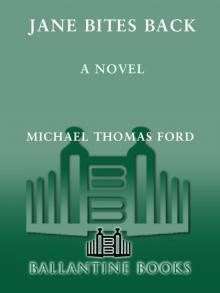 Jane Bites Back
Jane Bites Back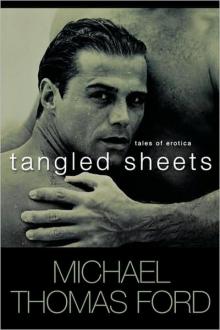 Tangled Sheets
Tangled Sheets Z
Z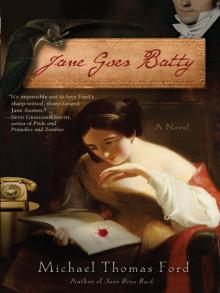 Jane Goes Batty
Jane Goes Batty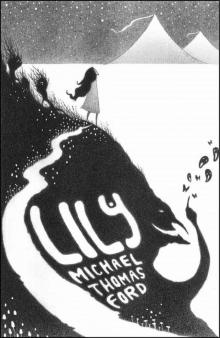 Lily
Lily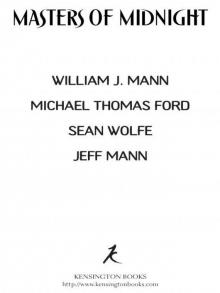 Masters of Midnight: Erotic Tales of the Vampire
Masters of Midnight: Erotic Tales of the Vampire The Road Home
The Road Home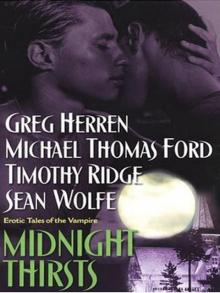 Midnight Thirsts: Erotic Tales of the Vampire
Midnight Thirsts: Erotic Tales of the Vampire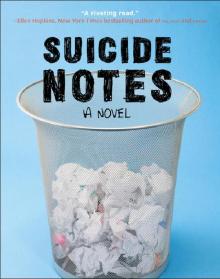 Suicide Notes
Suicide Notes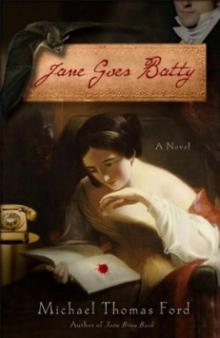 Jane Goes Batty jb-2
Jane Goes Batty jb-2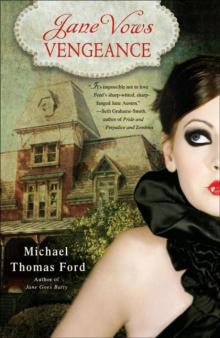 Jane Vows Vengeance jb-3
Jane Vows Vengeance jb-3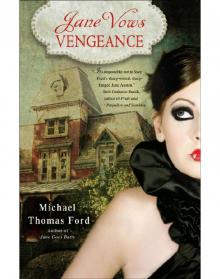 Jane Fairfax 3 - Jane Vows Vengeance
Jane Fairfax 3 - Jane Vows Vengeance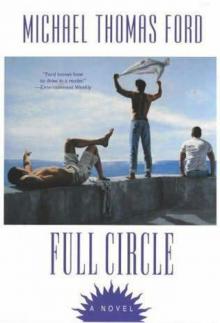 Michael Thomas Ford - Full Circle
Michael Thomas Ford - Full Circle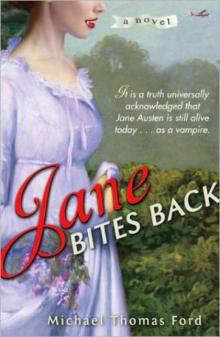 Jane Bites Back jb-1
Jane Bites Back jb-1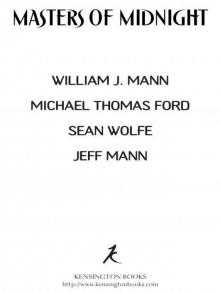 Masters of Midnight
Masters of Midnight